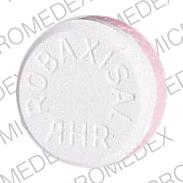Aspirin/methocarbamol Interactions
There are 636 drugs known to interact with aspirin/methocarbamol, along with 11 disease interactions, and 1 alcohol/food interaction. Of the total drug interactions, 89 are major, 528 are moderate, and 19 are minor.
- View all 636 medications that may interact with aspirin/methocarbamol
- View aspirin/methocarbamol alcohol/food interactions (1)
- View aspirin/methocarbamol disease interactions (11)
Most frequently checked interactions
View interaction reports for aspirin / methocarbamol and the medicines listed below.
- Abilify (aripiprazole)
- Acetylsalicylic Acid (aspirin)
- Adderall (amphetamine / dextroamphetamine)
- Advair Diskus (fluticasone / salmeterol)
- Advil (ibuprofen)
- Aleve (naproxen)
- Aspirin Low Strength (aspirin)
- Ativan (lorazepam)
- Bactrim (sulfamethoxazole / trimethoprim)
- Belbuca (buprenorphine)
- Celebrex (celecoxib)
- Cymbalta (duloxetine)
- Endocet (acetaminophen / oxycodone)
- Lantus (insulin glargine)
- Lyrica (pregabalin)
- Nexium (esomeprazole)
- Paracetamol (acetaminophen)
- Pristiq (desvenlafaxine)
- Quercetin (bioflavonoids)
- Seroquel (quetiapine)
- Topamax (topiramate)
- Tylenol with Codeine #3 (acetaminophen / codeine)
- Valium (diazepam)
- Ventolin HFA (albuterol)
- Vitamin B1 (thiamine)
- Vitamin B12 (cyanocobalamin)
- Vitamin C (ascorbic acid)
- Vitamin D3 (cholecalciferol)
- Zinc (zinc sulfate)
- Zyrtec (cetirizine)
Aspirin/methocarbamol alcohol/food interactions
There is 1 alcohol/food interaction with aspirin / methocarbamol.
Aspirin/methocarbamol disease interactions
There are 11 disease interactions with aspirin / methocarbamol which include:
- coagulation
- renal dysfunction
- asthma
- GI toxicity
- renal dysfunction
- Reye's syndrome
- seizures
- anemia
- dialysis
- G-6-PD deficiency
- hepatotoxicity
More about aspirin / methocarbamol
Related treatment guides
Drug Interaction Classification
| Highly clinically significant. Avoid combinations; the risk of the interaction outweighs the benefit. | |
| Moderately clinically significant. Usually avoid combinations; use it only under special circumstances. | |
| Minimally clinically significant. Minimize risk; assess risk and consider an alternative drug, take steps to circumvent the interaction risk and/or institute a monitoring plan. | |
| No interaction information available. |
See also:
Further information
Always consult your healthcare provider to ensure the information displayed on this page applies to your personal circumstances.


